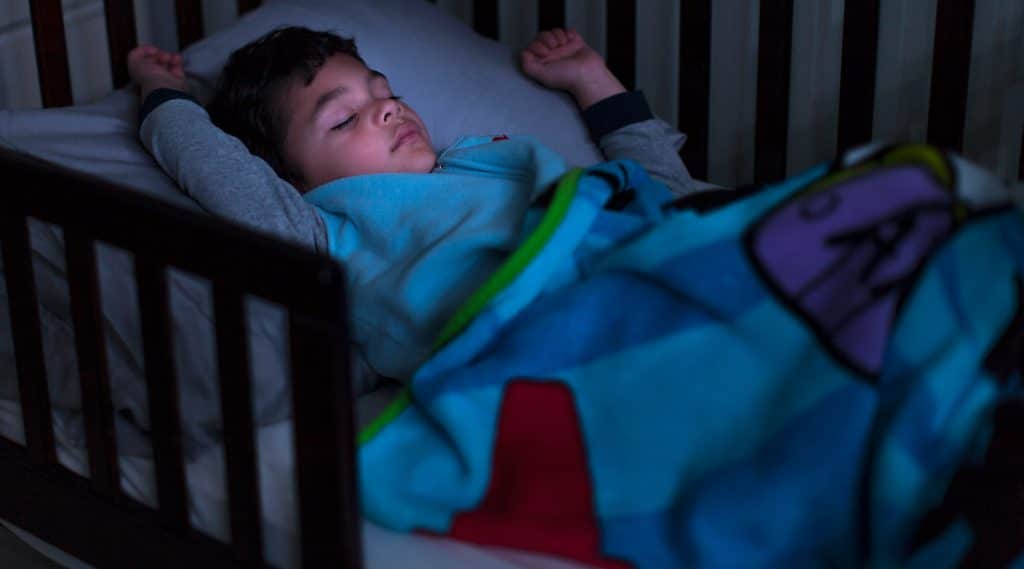Do you ever become worried if you witness your toddler coughing while they are sleeping? Even while it’s usual for kids to cough occasionally, it may be extremely upsetting when it keeps them up at night and makes you worry about their well-being. To reduce your concerns and guarantee the safety of your child, let’s look at some practical insights.
This can be caused by various factors starting from colds and allergies to serious respiratory issues. As a parent or caretaker, knowing how to respond to your kid’s needs is necessary for their well-being and comfort. This can help relieve their sufferings and ensure good health too.
In this article, we will look at what you can do if your toddler is coughing at night.
Common Triggers for Toddlers Coughing at Night
Numerous conditions such as upper respiratory infections, post nasal drip, allergies, asthma, GRED, croup, pneumonia, foreign object aspiration, environmental irritants, and teething might cause toddlers to cough at night.
In case the cough lingers or gets worse, keep an eye out for any accompanying symptoms and seek medical help. For an accurate diagnosis and treatment, seek the advice of a medical expert.
How to Address Toddler’s Night time Coughing
1. Stay Calm & Observe Their Behavior
The severity and nature of a toddler’s cough can be determined by observing the toddler’s behavior while they are coughing at night. This information may help you identify the cause and whether medical assistance is required. Try to resist the urge to run to your kids when you hear them coughing at night. Instead, wait a bit to see whether the coughing stops on its own. To avoid interfering with their normal coughing patterns, remain close by while being quiet and vigilant.
Observe how frequently your child coughs at night. Is it irregular, sporadic, or regular? Make a mental note of intervals between each cough and count how many times it occurs. Pay close attention to the sound of the cough. Is the sound barking, dry and hacking, or wet and phlegmy? The type of cough might determine the likely cause.
Check to discover if there are any known causes of the cough. Do they have any worsening symptoms, for instance, when your child lies down or is exposed to certain allergens like dust or pet dander? A fever, wheezing, runny or stuffy nose, sore throat, or any other comorbid symptoms should also be kept watch out for. You should also be alert for any changes in behavior or sleep patterns.
2. Create a Comfortable Sleep Environment
If your toddler coughs at night, you need to make sure to provide them with a cozy sleeping environment. They can feel more comfortable and get more rest, which is crucial for their recovery in a calm and comfortable sleeping environment. Wondering how to create that one? Here you go! Inflammation in the throat and airways, as well as coughing, can be made worse by dry air. If your toddler’s room needs more moisture, then think about utilizing a cool mist humidifier. This may ease their respiratory tracts and lessen coughing. Make a moderate inclination by raising the head of your toddler’s mattress.
In addition to easing coughing that could get worse when resting flat, this elevation can assist in lessening the postnasal drip. The recommended room temperature is from 68-72 degrees Fahrenheit. To ensure proper ventilation, you can open a window or utilize a fan. To create a gloomy bedroom, use blackout curtains or blinds. Melatonin, a hormone that promotes deeper, more restful sleep, is produced by the body in response to darkness. Last but not least, don’t forget to give your toddler soft and cozy bedding.
4.Elevate the Head of The Bed
Toddlers who cough at night may benefit from having the head of the bed elevated, particularly if postnasal drip and congestion are the cause of the cough or make it worse. The head of the bed can be raised to create a moderate inclination that can assist in lessening coughing and mucus backflow by preventing it from accumulating in the throat. Excess mucus can build up in the nasal passages in children who have runny or stuffy noses as a result of colds and allergies.
While your kids are sleeping, this mucus may trickle down the back of your throat, producing irritation and coughing. Elevating the head can help stop this flow and keep the mucus from getting to the throat. For toddlers with mild congestion or respiratory problems, sleeping on an inclined surface might make it easier to breathe. Particularly if the cough is brought on by nasal or chest congestion, it widens the airways, which makes breathing easier for them.
5. Monitor for Other Symptoms
The typical cold, the flu, respiratory infections, allergies, asthma, and even more serious disorders can all manifest as coughing in toddlers. Medical practitioners can make a more accurate diagnosis by keeping track of other symptoms. Other symptoms’ presence and intensity can give clues as to how serious the underlying illness is. Some symptoms might need to be treated by the doctor right away, while others might be treated at home. Possibly you might be wondering about how to monitor these symptoms. For this, you can begin by recording the frequency, length, and severity of the toddler’s cough in a journal.
When your toddler is coughing at night, you should also note any additional symptoms such as fever, runny nose, sore throat, breathing problems, wheezing, fatigue, vomiting, and diarrhea. In both the resting and coughing states, pay close attention to the toddler’s respiration. A severe respiratory condition may be indicated by rapid or difficult breathing. If the toddler feels warm on the touch, take regular body temperature readings.
Because with respiratory infections, fever is common. Seek medical attention if the toddler exhibits any unusual signs of irritability, exhaustion, or withdrawal. Make sure the toddler’s bedroom is tidy and devoid of any allergens that can exacerbate their symptoms.
6. Provide Plenty of Fluids
For various reasons, it is crucial to give a toddler who is coughing at night lots of water. Increased fluid loss and dehydration can result from coughing, especially when it’s coupled with other symptoms like fever and lung congestion. Water intake should be sufficient to promote a toddler’s general recovery while also easing symptoms and avoiding problems. Warm liquids, including herbal teas or water, can help calm or moisturize sore airways. Warm liquids help ease the throat discomfort and dryness brought on by coughing. They also have a mildly soothing effect.
Drinking enough fluids keeps the respiratory tract wet, which facilitates the toddler’s ability to release mucus. Coughing may be reduced as a result, and respiratory infections may heal more quickly. Dehydration brought by insufficient fluid intake might increase the symptoms and make the toddler feel worse during illness. In addition to electrolyte imbalances and weekend immunological response, dehydration can cause further problems.
There are plenty of other options that you can try at home that the healthcare experts suggest to keep the toddler’s coughing at night under check and provide them relieve for the same.
7. Avoid Irritants
For a toddler who is coughing at night, avoiding irritants is essential for controlling their symptoms and hastening recovery. Several things can bring on toddler coughing, and being around hassles can make it worse, making it harder to fall asleep and causing more discomfort. A child’s coughing can be relieved, sleep quality can be enhanced, and the healing process can be supported by reducing the presence of irritants in the child’s environment.
Typical irritants include dust, pollen, pet dander, strong odors, tobacco smoke, and some cleaning chemicals. You can aid in lowering the frequency and severity of the toddler’s coughing bouts by removing or reducing exposure to certain irritants. The airways might become inflamed or irritated at the time of cough, which makes them more vulnerable to allergens. The child’s cough may get worse when they are exposed to irritants like smoke, creating a cycle of greater irritability and increased coughing. Eliminating irritants calms the airways and promotes appropriate healing. The toddler’s sleep may be disturbed by nighttime coughing, which can cause agitation and exhaustion. Lastly, creating a pleasant sleeping environment will also help your toddlers recover fast.
8. Consult a Healthcare Professional
It’s crucial to seek medical advice if the toddler coughs at night. This behavior can indicate several underlying illnesses, some of which may need treatment. Even though the occasional cough can be considered normal, chronic or severe coughing, especially at night, maybe a sign of more serious problems. Here are some instances where it would be appropriate to consult a doctor regarding the toddler’s coughing at night. It may be a symptom of the problem if the toddler’s cough lasts for more than a few days or gets worse over time.
Numerous illnesses, including respiratory infections, allergies, asthma, and even more serious ones, can result in chronic cough. Note that if your toddler is breathing laboriously or rapidly, this could indicate a more serious respiratory condition that needs to be treated immediately. When the cough is present at a high temperature (over 102℉ or 39℃), you may have a viral or bacterial infection that needs to be examined and treated by a doctor. Medical treatment is required to maintain fluid and electrolyte balance if the toddler’s coughing is followed by symptoms of dehydration, including decreased urine production, dry mouth, or lethargy.
Summing It Up
All in all, managing a toddler’s nightly coughing can be difficult for parents, but it is manageable with appropriate strategy and information. It is important to keep in mind that while the odd cough is natural, continuous or severe coughing at night may point to a problem that needs to be addressed.
Note that better sleep and speedy recovery can be encouraged by providing a clean, allergen-free sleeping environment. Consider the individuality of each child while controlling your toddler’s coughing at night because what might work for one may not work for another. Have some patience, and believe in your gut. Generally, toddlers recover from cough and respiratory infections with the right care and attention and then resume their happy selves.
Always put your child’s comfort and well-being first and don’t hesitate or step back to seek medical help if necessary.
















